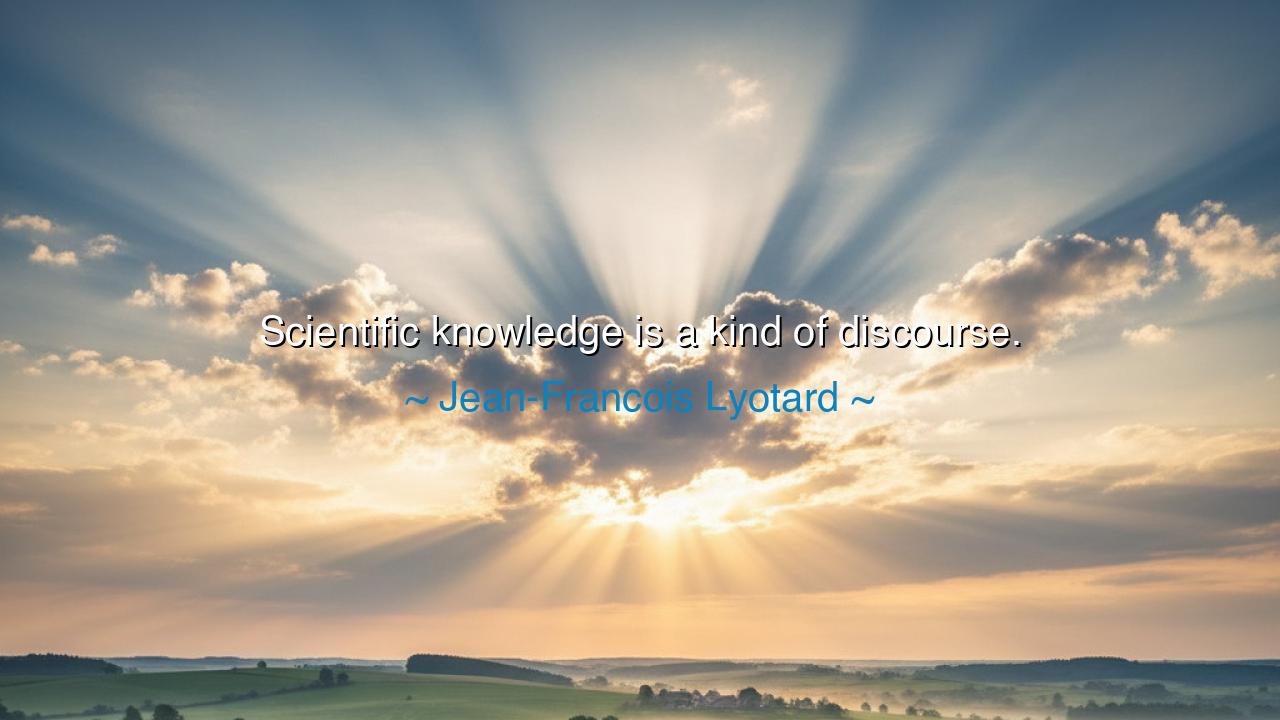
Scientific knowledge is a kind of discourse.






“Scientific knowledge is a kind of discourse.” Thus spoke Jean-François Lyotard, philosopher of the postmodern age, who looked beyond the surface of knowledge to see its hidden structures. In this short sentence lies a revelation: that science, though often exalted as the voice of eternal truth, is also a discourse—a way of speaking, a way of framing the world, a conversation shaped by human minds, societies, and histories. It is not a pure light descending untouched from the heavens, but a torch passed from hand to hand, carried by language, culture, and power.
The origin of this thought lies in Lyotard’s reflections on knowledge itself. He lived in a century scarred by war, ideology, and technological upheaval. He saw that the old grand narratives—the certainties of religion, the promises of progress, the authority of reason—had fractured. In their place arose many voices, each claiming truth. Science, too, he saw as one voice among others: powerful, rigorous, persuasive, but still bound by the rules of discourse, by the grammar of experiments, the rhetoric of mathematics, the institutions of academia. To call it discourse is not to diminish it, but to remind us that it is human, living, evolving.
Consider the story of Galileo. He observed the moons of Jupiter, the phases of Venus, the mountains of the Moon. His telescope revealed truths undeniable to the eye. Yet truth alone was not enough. He had to speak it, argue it, defend it in words. His knowledge was entangled with the discourse of his age, the opposition of the Church, the rhetoric of scripture, the politics of authority. His discoveries triumphed not only because they were true, but because he and those after him could weave them into a discourse that persuaded and endured. Here we see Lyotard’s wisdom: even the greatest truths live through language, debate, and power.
The same may be seen in the twentieth century with Einstein. The equations of relativity are precise, elegant, exact. Yet their acceptance required more than mathematics—it required discourse among physicists, experiments with clocks and light, debates in journals and congresses. Scientific knowledge advanced as a conversation, each voice testing, challenging, refining. Without this living discourse, the equations would have remained symbols on paper, obscure and forgotten. Science grows not in silence but in dialogue.
Lyotard’s words also carry a warning. To see science as discourse is to understand that it is not immune to error, to fashion, to politics. There have been times when the discourse of science justified eugenics, or silenced dissenting voices, or was bent to serve empire and war. Knowledge, when treated as unquestionable, becomes dogma; but when remembered as discourse, it remains open to challenge, correction, and growth. The humility to see science as conversation protects it from corruption and keeps it true to its quest.
Yet, do not mistake this for weakness. To call science discourse is not to strip it of power—it is to honor its resilience. For discourse is dialogue, and dialogue endures. Through questioning, through debate, through experiment, science refines itself. Unlike dogma, which fears contradiction, scientific discourse thrives on it. In this lies its strength: it is not a static truth carved in stone, but a living truth, sharpened in the fire of conversation across centuries.
So, O listener, take this lesson into your heart: when you encounter knowledge, whether scientific or otherwise, remember that it is a discourse—a dialogue that invites you to listen, to question, and to join. Do not revere science as an idol beyond doubt, nor dismiss it as mere opinion, but engage with it as a conversation guided by rigor and humility. In your own life, let your truths also be discourse: speak them, test them, refine them with others. For knowledge that cannot be spoken, cannot be questioned, cannot be shared—is not knowledge at all.






AAdministratorAdministrator
Welcome, honored guests. Please leave a comment, we will respond soon